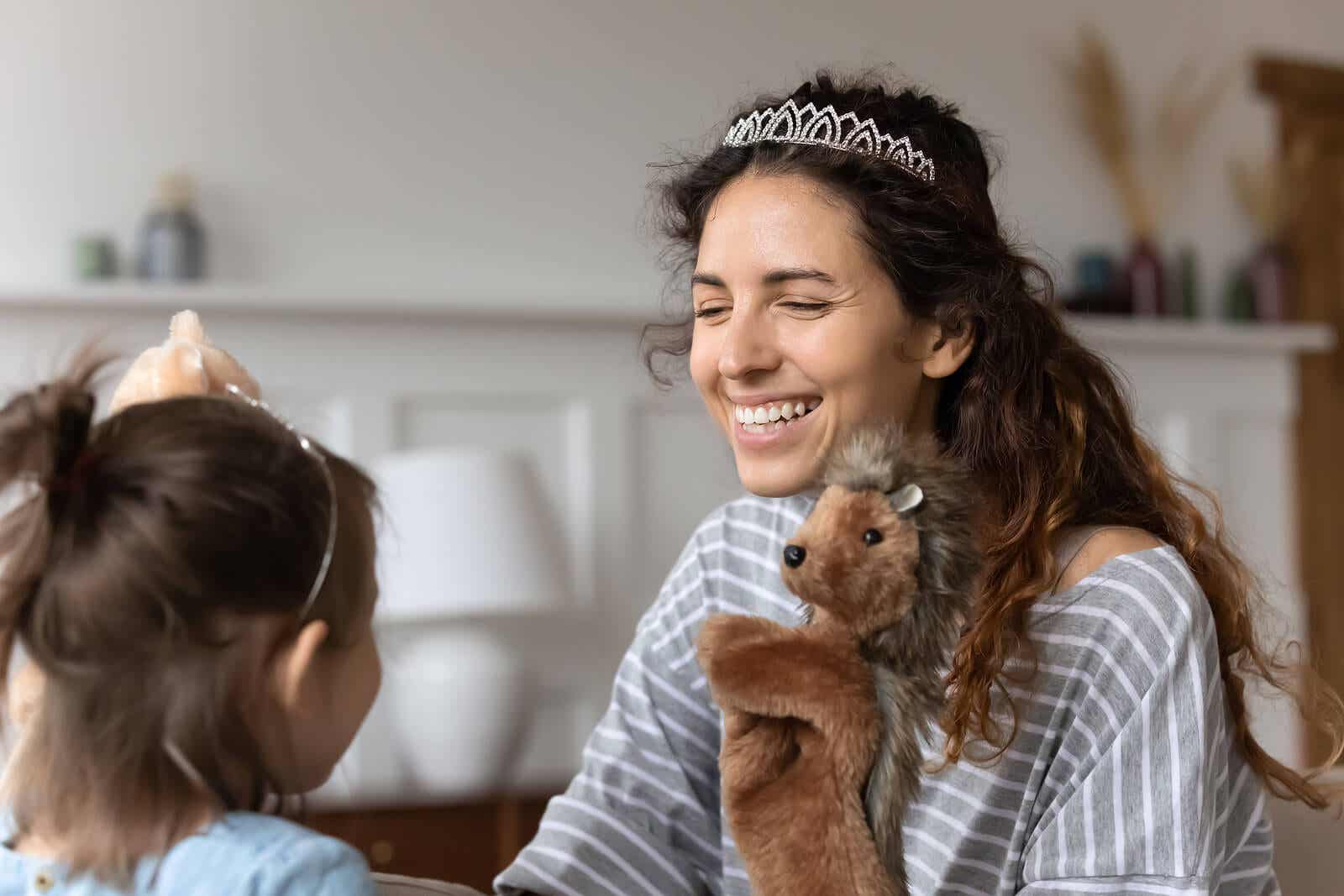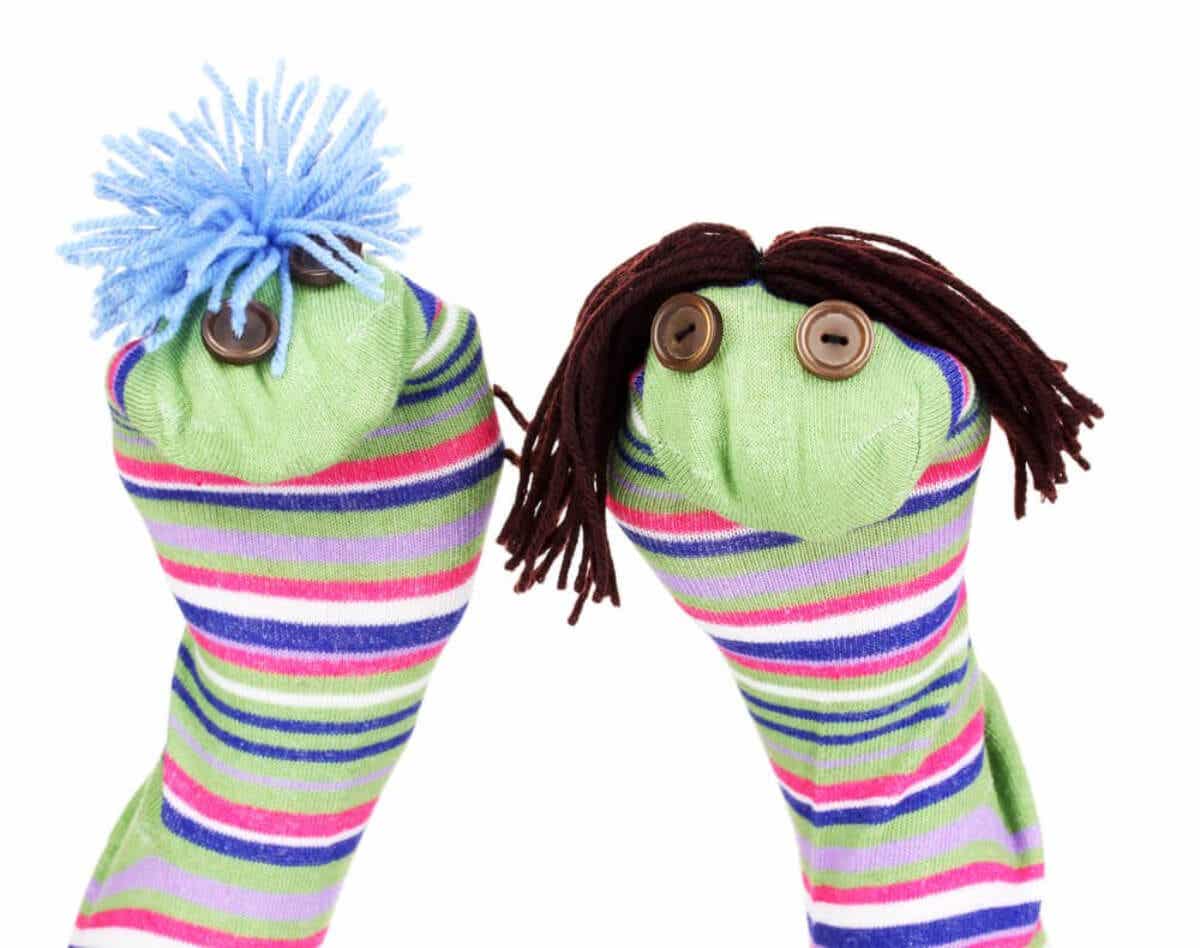Benefits of Playing with Puppets in Early Childhood

Playing with puppets is one of the most educational activities you can expose your children to. Watching a child play with a puppet can seem fun and entertaining. But playing with them is so much more than that.
When you realize all the benefits of this activity, you may want a basket of puppets at home to encourage the complete development of your children in their early childhood.
Types of puppets for small children
The great thing about puppets is that they don’t have to be expensive models to enjoy them. A sock can be a very fun puppet for children.
In this sense, little ones love to play hide and seek, and a puppet can be the perfect companion for this activity. So, make one out of a paper bag or try making one out of string using cardboard boxes or toilet paper rolls.
The purpose of the puppet is to create interaction, fun dialogue, and even an element of surprise in play and learning activities. Playing with them will be beneficial to your child’s development in the early learning years. So, below, we’re going to name some of the benefits of playing with puppets for children.

Benefits of playing with puppets
First, you need to know that these hand-held toys have the potential to improve language skills, creativity, social awareness, and more. Don’t miss the following examples of how puppets can offer great benefits for child development.
Language development
Children love to have “conversations” with puppets. Every verbal interaction with these puppets will encourage language development. Little ones, who are generally shy, really benefit from the opportunity to let the puppet be their voice.
It’s also possible to have a conversation between two puppets. Using one in each hand allows you to have a dialogue between two characters.
Social development
A shy child or one who’s still learning social skills has the opportunity to be more sociable through a puppet. He becomes the spokesperson of the group. Therefore, a puppet can be the voice used to correct table manners or other social skills.
It can also become the instructor and children often enjoy listening to the puppet teaching them to be social. In this sense, it’s not their mom’s or dad’s voice setting the rules again, but a fun puppet character.
Emotional development, one of the benefits of playing with puppets
Puppets can teach children about their emotions. Little ones can interact with these puppets as they share their ability to be happy, sad, angry, funny, or jealous…
In this sense, children can also express these emotions without feeling that they’ll upset anyone because their character’s the one who feels these emotions. Playing with them helps to develop the characteristics of sympathy and empathy. Children also experience this type of expression when they participate in symbolic games.
Listening skills
The puppet in your hand can encourage little ones to listen while you give them instructions or tell them a story. They can help them learn rhymes and songs while they also imitate the puppet.
Motor skills
There are a number of motor skills that children can improve by playing with puppets. The fine movement required to use a puppet helps with dexterity and the use of fingers to manipulate it, and it improves fine motor coordination.
In addition, puppets help with hand-eye coordination when the puppet is made to walk and move in different directions. All of these skills improve balance and directionality, all while the child has a lot of fun playing with them.
Developing self-confidence
Putting on a puppet show often happens spontaneously when children have access to puppets. It’s really encouraging to see how little ones develop their self-confidence through the act of handling a puppet. As their confidence grows, they’ll be happy to teach their skills to friends or family members.

Creativity, another great benefit of playing with puppets
As if that weren’t enough, puppets encourage creativity on several different levels. Making your own puppets out of recycled socks or paper bags is just the starting point. There are many interesting ways to create your own characters.
Then, creativity continues to flow as children create their own puppet show. The show will require a simple puppet theater. Decorating an old cardboard box for this purpose adds to the creativity factor.
Storytelling and sequencing
Storytelling comes alive with puppets. Retelling favorite fairy tales is a great way to put on a puppet show. Learning to repeat the rhyming part of a story helps with memory skills. It allows children to become the characters in their stories and even very small children can get in on the action.
In short, do you realize all the benefits of playing with puppets? You can’t pass up the opportunity for your children to have a wonderful basket of puppets at home to play with whenever they want.
Playing with puppets is one of the most educational activities you can expose your children to. Watching a child play with a puppet can seem fun and entertaining. But playing with them is so much more than that.
When you realize all the benefits of this activity, you may want a basket of puppets at home to encourage the complete development of your children in their early childhood.
Types of puppets for small children
The great thing about puppets is that they don’t have to be expensive models to enjoy them. A sock can be a very fun puppet for children.
In this sense, little ones love to play hide and seek, and a puppet can be the perfect companion for this activity. So, make one out of a paper bag or try making one out of string using cardboard boxes or toilet paper rolls.
The purpose of the puppet is to create interaction, fun dialogue, and even an element of surprise in play and learning activities. Playing with them will be beneficial to your child’s development in the early learning years. So, below, we’re going to name some of the benefits of playing with puppets for children.

Benefits of playing with puppets
First, you need to know that these hand-held toys have the potential to improve language skills, creativity, social awareness, and more. Don’t miss the following examples of how puppets can offer great benefits for child development.
Language development
Children love to have “conversations” with puppets. Every verbal interaction with these puppets will encourage language development. Little ones, who are generally shy, really benefit from the opportunity to let the puppet be their voice.
It’s also possible to have a conversation between two puppets. Using one in each hand allows you to have a dialogue between two characters.
Social development
A shy child or one who’s still learning social skills has the opportunity to be more sociable through a puppet. He becomes the spokesperson of the group. Therefore, a puppet can be the voice used to correct table manners or other social skills.
It can also become the instructor and children often enjoy listening to the puppet teaching them to be social. In this sense, it’s not their mom’s or dad’s voice setting the rules again, but a fun puppet character.
Emotional development, one of the benefits of playing with puppets
Puppets can teach children about their emotions. Little ones can interact with these puppets as they share their ability to be happy, sad, angry, funny, or jealous…
In this sense, children can also express these emotions without feeling that they’ll upset anyone because their character’s the one who feels these emotions. Playing with them helps to develop the characteristics of sympathy and empathy. Children also experience this type of expression when they participate in symbolic games.
Listening skills
The puppet in your hand can encourage little ones to listen while you give them instructions or tell them a story. They can help them learn rhymes and songs while they also imitate the puppet.
Motor skills
There are a number of motor skills that children can improve by playing with puppets. The fine movement required to use a puppet helps with dexterity and the use of fingers to manipulate it, and it improves fine motor coordination.
In addition, puppets help with hand-eye coordination when the puppet is made to walk and move in different directions. All of these skills improve balance and directionality, all while the child has a lot of fun playing with them.
Developing self-confidence
Putting on a puppet show often happens spontaneously when children have access to puppets. It’s really encouraging to see how little ones develop their self-confidence through the act of handling a puppet. As their confidence grows, they’ll be happy to teach their skills to friends or family members.

Creativity, another great benefit of playing with puppets
As if that weren’t enough, puppets encourage creativity on several different levels. Making your own puppets out of recycled socks or paper bags is just the starting point. There are many interesting ways to create your own characters.
Then, creativity continues to flow as children create their own puppet show. The show will require a simple puppet theater. Decorating an old cardboard box for this purpose adds to the creativity factor.
Storytelling and sequencing
Storytelling comes alive with puppets. Retelling favorite fairy tales is a great way to put on a puppet show. Learning to repeat the rhyming part of a story helps with memory skills. It allows children to become the characters in their stories and even very small children can get in on the action.
In short, do you realize all the benefits of playing with puppets? You can’t pass up the opportunity for your children to have a wonderful basket of puppets at home to play with whenever they want.
All cited sources were thoroughly reviewed by our team to ensure their quality, reliability, currency, and validity. The bibliography of this article was considered reliable and of academic or scientific accuracy.
- Artola Gónzale, T., Huego, M., A. (2006) Cómo desarrollar la creatividad en los niños. Editorial: PALABRA.
This text is provided for informational purposes only and does not replace consultation with a professional. If in doubt, consult your specialist.








